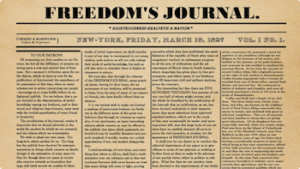
Freedom's Journal (copy)
*On this date, in 1827, the Freedom’s Journal newspaper was founded. It was the first Black-owned and operated newspaper in the United States.
Started by a group of free Black men in New York City, the paper served to counter racist commentary published in the white press. As a four-page, four-column standard-sized weekly Freedom’s Journal was established the same year slavery was abolished in New York State. Samuel E. Cornish and John B. Russwurm served as their senior and junior editors. The Journal consisted of news of current events, anecdotes, and editorials. It addressed contemporary issues such as slavery and "colonization," a concept conceived in 1816 to repatriate free Black people to Africa.
Initially opposed to colonization efforts, Freedom’s Journal denounced slavery, advocated for Black people’s political rights and the right to vote, and spoke out against lynchings. Freedom’s Journal provided its readers with regional, national, and international news that could entertain and educate them. It sought to improve conditions for the over 300,000 newly freed Black men and women living in the North. The newspaper broadened readers’ knowledge of the world by featuring articles on such countries as Haiti and Sierra Leone. As a paper of record, Freedom’s Journal published birth, death, and wedding announcements.
It featured biographies of renowned Black figures, such as Paul Cuffe, Touissant L’Ouverture, and poet Phyllis Wheatley, to encourage Black achievement. The paper also printed school, job, and housing listings. At various times, the newspaper employed between 14 to 44 agents to collect and renew subscriptions, including David Walker from Boston, the writer of "David Walker’s Appeal," which called for slaves to rebel against their masters. Freedom’s Journal was soon circulated in 11 states, the District of Columbia, Haiti, Europe, and Canada. A typical advertisement costs between 25 to 75 cents.
Russwurm became the sole editor of Freedom’s Journal following the resignation of Cornish in September 1827 and began to promote the colonization movement. Most of the newspaper’s readers did not support the paper’s radical shift in support of colonization, and in March 1829, Freedom’s Journal ceased publication. Freedom’s Journal’s two-year existence helped spawn other publications. By the start of the Civil War, over 40 Black-owned and operated papers had been established throughout America.
Black Saga The African American Experience A Chronology
by Charles M. Christian
Copyright 1995, Civitas/Counterpoint
ISBN 1-58243-000-4